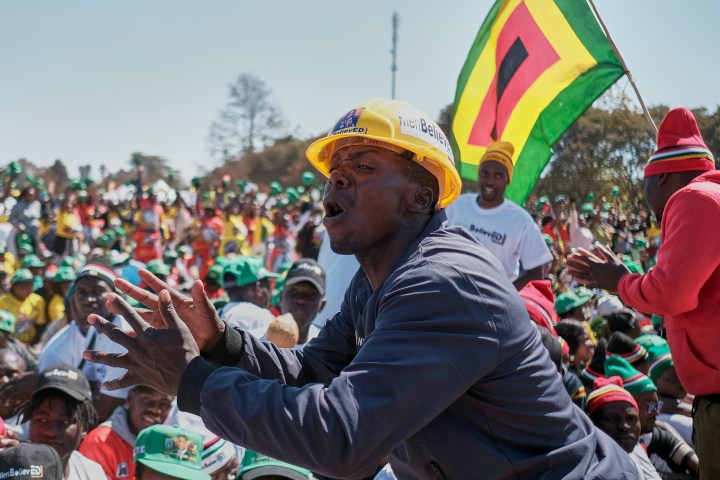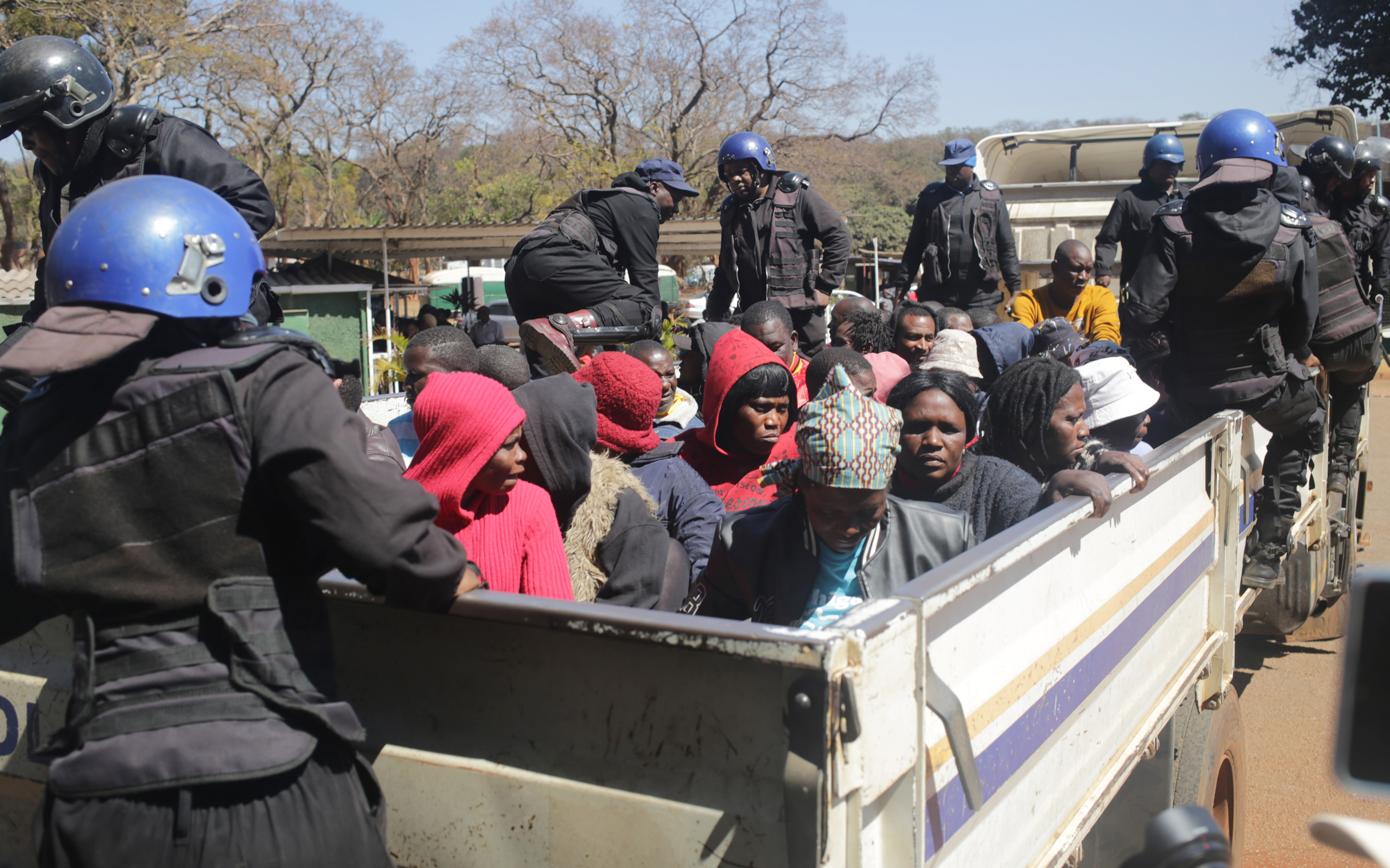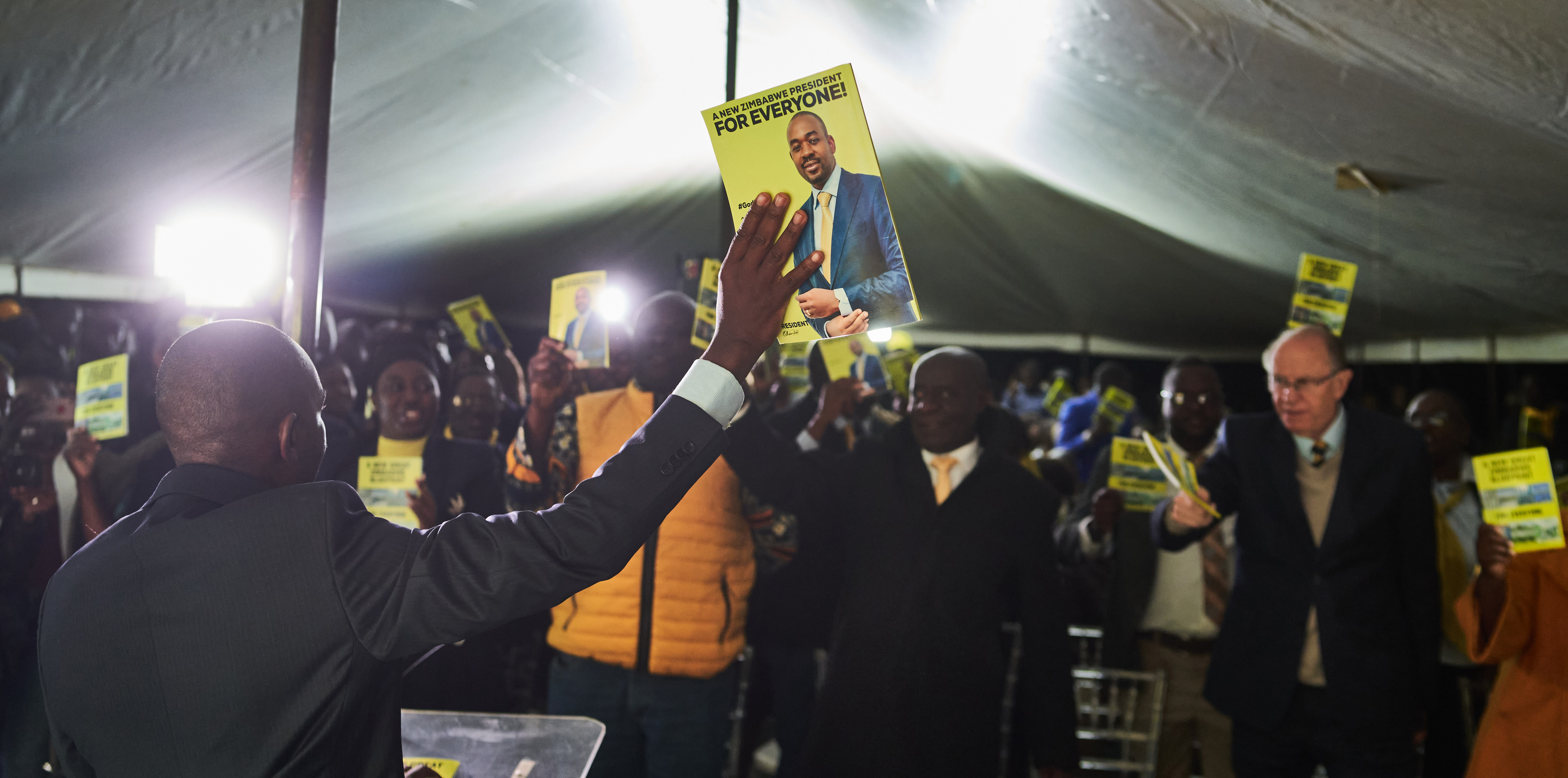
The indictment against Donald Trump and 18 others brought in Georgia this week offered a moment of clarity. District Attorney Fani Willis framed the former American president’s anti-democratic behaviour as a Mafia-style criminal conspiracy with the purpose of defrauding the voters.
Zanu-PF could teach Trump and his bumbling band — who tried to overturn the results after they had lost the 2020 election — a few lessons about how to “win” an election by loading the dice in advance.
Here’s what has happened already — before people start voting on Wednesday.
Days before the election the Citizens Coalition for Change (CC) was denied a request to see the final voter’s roll and polling stations by high court Judge Never Katiyo who dismissed it as “not urgent”. Almost 100 CCC rallies have been banned. Dozens of opposition members were arrested for “blocking traffic” during a campaign road show. CCC members have been attacked and one activist was stoned to death.

Fourty arrested opposition Citizens Coalition for Change (CCC) members aboard a police truck arrive at the Harare Magistrate’s Courts, in Harare, Zimbabwe on 17 August, 2023. The 40, who include party aspiring Member of Parliament Gladmore Hakata for Glenview South, were arrested for allegedly holding an unsanctioned car procession to solicit support ahead of the country’s elections set for 23 August, 2023. (Photo: EPA-EFE/Aaron Ufumeli)
Government food aid has been handed out disguised as a Zanu-PF programme. Rural voters have been intimidated and warned that their ballots are not secret. A draconian “Patriot Act” clamping down on freedom of expression and association was signed by president Emmerson Mnangagwa last month and though it hasn’t been implemented yet, it has had a chilling effect.
Forever Associates Zimbabwe (FAZ), a creepy front organisation linked to Zanu-PF, has been accused of putting up fake opposition candidates to sow confusion. Some local police are doing their own thing, squishing opposition activity even without orders from the top.
Zanu PF controls state media, international observers have been cherry picked; and many international publications, including Daily Maverick, have been denied accreditation.
Veteran Zimbabwean journalist Hopewell Chin’ono said: “How can such a charade of an election be deemed remotely free, fair and credible?”
And yet the real challenges of this election are still ahead.
Observer mission
How many of the 12,370 polling stations will be monitored on election day by the handful of international monitors that have been let in?
ISS’ Pigou questions whether the 150 EU monitors are equipped for an observer mission. “They won’t have the wherewithal to comprehensively investigate intimidation and coercion once the thousand cuts are in place.
“At best they probably will say something about state media, which is easy. I think Mnangagwa can risk them raising some problems — but it’s like putting lipstick on a pig.”
Do the CCC and civil society have the capacity not only to get out the vote but to make sure there is no manipulation in the counting and transmission of votes by the Zimbabwe Electoral Commission (ZEC)?
Given all these challenges it is more than amazing that, going into the final weekend, a mood of optimism is spreading through opposition ranks.

Nelson Chamisa, leader of the Zimbabwe main opposition Citizens Coalition for Change addressing delegates during a manifesto launch in Bulawayo on 8 August, 2023. (Photo: Zinyange Auntony / AFP)
The rallies of CCC leader Nelson Chamisa have been well attended and exuberant. So many people want change. Chamisa’s pastoral style and his references to God being on his side are more potent than the CCC election manifesto that was only released last week. The fact that it is “game on” is miraculous.
The best predictive polling was done by Afrobarometer about a month ago and it had Mnangagwa at 35% and Chamisa at 27%. About a quarter of the respondents refused to state their preference.
While Zanu-PF probably has the edge, no one really knows what is going to happen. A high turnout could produce a shock.
Results dispute inevitable
The only sure thing is that the result will be disputed. If the CCC wins, how likely is it that Zanu-PF will allow a transfer of power? The institutions that are supposed to protect democracy — the ZEC, the courts and the police — have all been captured to varying degrees by the ruling party.
Even if Chamisa wins the presidential election, he will not have the majority in the parliament so will have to come to an understanding with Zanu-PF.
If Zanu-PF wins, the CCC, as in 2018, will protest and litigate but is unlikely to get a fair crack in the courts.
If all else fails, it will be left to the military who have shown — when they made Robert Mugabe walk the plank in November 2017 — that they are the final arbiters of political power In Zimbabwe.
Even a messy aftermath, however, is unlikely to be enough to convince the region, the continent, and the Europeans that this bears only a slight resemblance to democracy.
EU Ambassador Jobst von Kirchmann, an advocate of constructive engagement with Zimbabwe, probably understands that the only game in town is the high-level debt and arrears negotiations that are being driven by Akinwumi Adesina, the President of the African Development Bank.
Adesina has said that there will be no deal if there is a bad election, but how bad does it have to be? How willing is he and the creditors to accept shortcomings?
The one sticking point will be that the Zimbabwe Democracy and Recovery Act (Zidera) bars the US from easing sanctions because the conduct of the election falls well short of the specific requirements in the law.
This will provide Zanu-PF, and those in the ANC that have repeated this narrative, the benefit of being able to keep blaming “illegal US sanctions” for the parlous state of the Zimbabwean economy, even though this claim has been repeatedly debunked.
It was the misgovernance of the Mugabe regime and the destruction of large-scale commercial agriculture that put Zimbabwe in a hole from which it has never recovered. Mnangagwa has made some meaningful reforms, but Zanu-PF continues to breed corruption and contempt for democracy.
It will take a colossal blow-up and some real blood on the streets for the international community to cry foul in this election. Short of that, they can go home having dodged a bullet.
But the problem will not have disappeared. In five years’ time, it will be the same story, if not much worse. Though Zimbabwe is ahead of the game, much of the SADC region is moving down the same dark path.
With some important exceptions, SADC members have ruling party syndrome. It afflicts former liberation movements as they grow decrepit and decline and are unable to generate new ideas or tolerate pluralism or the natural evolution of politics.
Fikile Mbalula support for Zanu-PF
ANC Secretary General Fikile Mbalula, who parrots the Zanu-PF line to the extent of calling Chamisa a “puppet of America”, has raised the hoary old banner of solidarity with a fellow liberation movement.
If Mbalula wants to see what “liberation” looks like after 43 years, he should speak to a pregnant woman who has to brave a hostile border in order to find a hospital in which to give birth.
He should ask why at least a quarter of the population of Zimbabwe has fled into neighbouring countries while a few well-connected oligarchs, the top brass of the military and a handful of old white Rhodies are still creaming it.
Pigou says that the “cancer at the heart of SADC” is around the politics of the dominant party and the “inability to embrace democratic culture and move beyond an obsession with control by the state.
“We are kind of trapped in that framework and it’s difficult to see how we will ever break out of it.” DM
Phillip van Niekerk is the author of Africa Unscrambled, a newsletter covering the continent in a way you won’t read anywhere else. Get unscrambled by signing up here. He is also the editorial director of Scrolla.Africa.


